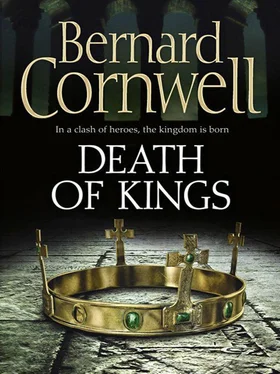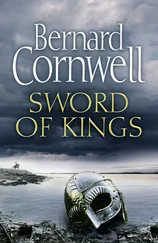‘What forces do you have?’
‘The fyrd, lord, and twenty-two warriors.’
‘How many fyrd?’
‘Four hundred and twenty, lord.’
‘Keep them here,’ I said, ‘because the Danes will probably be back.’ When Alfred was on his deathbed I had told him that the Northmen had not learned how to fight us, but we had learned how to fight them, and that was true. They had made no attempt to capture Cracgelad, except for a feeble summons for the town to surrender, and if thousands of Danes could not capture one small burh, however formidable its walls, then they had no chance against Wessex’s larger garrisons, and if they could not capture the large burhs and so destroy Edward’s forces inside, then eventually they must retreat. ‘What Danish banners did you see?’ I asked Father Kynhelm.
‘None plainly, lord.’
‘What is Eohric’s banner?’ I asked everyone in earshot.
‘A lion and a cross,’ Osferth said.
‘Whatever a lion is,’ I said. I wanted to know if Eohric’s East Anglians had joined the Danish horde, but Father Kynhelm did not have the answer.
Next morning it was raining again, the drops pitting the Temes as it slid past the burh’s walls. The low cloud made it hard to distinguish the smoke plumes, but my impression was that the fires were not far south of the river. Æthelflaed went to Saint Werburgh’s convent and prayed, Osferth found a carpenter in the town who jointed his cross properly and fixed it with nails, while I summoned two of Merewalh’s men and two of Steapa’s troops. I sent the Mercians to Gleawecestre with a message for Æthelred. I knew that if the message came from me he would ignore it utterly, and so I ordered them to say it was a request from King Edward that he bring his troops, all his troops, to Cracgelad. The great army, I explained, had crossed the Temes at the burh and would almost certainly withdraw the same way. They could, of course, choose another ford or bridge, but men have a habit of using the roads and tracks they already know. If Mercia assembled its army on the northern bank of the Temes then Edward could bring the West Saxons from the south and we would trap them between us. Steapa’s men carried the same message to Edward, except that message came from me and was merely a strong suggestion that as the Danes withdrew he should concentrate his army and follow them, but not attack until they were already crossing the Temes.
It was around mid morning that I gave the order to saddle the horses and be ready to ride, though I did not say to where, then just as we were about to depart two messengers arrived from Bishop Erkenwald in Lundene.
I never liked Erkenwald, while Æthelflaed had hated him ever since he had preached a sermon on adultery and stared at her throughout, but the bishop knew his business. He had sent messengers along every Roman road from Lundene with orders to seek out Mercian or West Saxon forces. ‘He said to keep a watchful eye for you, lord,’ one of the two men said. He was from Weohstan’s garrison and told us that the Danes were outside Lundene’s walls, but not in any great force. ‘If we threaten them, lord, they retreat.’
‘Whose men are they?’
‘King Eohric’s, lord, and a few follow Sigurd’s banner too.’
So Eohric had joined the Danes and not the Christians. Erkenwald’s messengers said they had heard that the Danes had assembled at Eoferwic, and from there they had taken ship to East Anglia, and while I had been lured to Ceaster, that great army, reinforced by Eohric’s warriors, had launched themselves across the Use and started their path of fire and death. ‘What are Eohric’s men doing at Lundene?’ I asked.
‘They just watch, lord. There aren’t enough of them to make an assault.’
‘But enough to keep troops inside the walls,’ I said. ‘So what does Bishop Erkenwald want?’
‘He hoped you would go to Lundene, lord.’
‘Tell him to send me half of Weohstan’s men instead,’ I said.
Bishop Erkenwald’s request, I suspected it had been couched as an order that the messengers had softened into a suggestion, made small sense to me. True, Lundene needed to be defended, but the army that threatened that city was here, south of the Temes, and if we moved fast we could trap it here. The enemy force at Lundene was probably only there to keep the city’s large garrison from sallying out to confront the great army. My expectation was that the Danes would plunder and burn, but eventually they would either have to besiege a burh or else be fought in the open country by a West Saxon army, and it was more important to know where they were and what they intended than to gather in far Lundene. To defeat the Danes we had to meet them in open battle. There could be no escape from the horrors of the shield wall. The burhs might stave off defeat, but victory came in face-to-face combat, and my thought was to force a battle when the Danes were recrossing the Temes. The one thing I did know was that we had to choose the battlefield, and Cracgelad, with its river, causeway and bridge was as good a place as any, as good as the bridge at Fearnhamme where we had slaughtered the army of Harald Bloodhair after trapping it when only half his troops were across the river.
I gave Erkenwald’s messengers fresh horses and sent them back to Lundene, though without much hope that the bishop would despatch reinforcements unless he received a direct order from Edward, then I led most of our force across the river. Merewalh stayed in Cracgelad, and I had told Æthelflaed to remain with him, but she ignored the order and rode beside me. ‘Fighting,’ I growled at her, ‘is not women’s business.’
‘What is women’s business, Lord Uhtred?’ she asked with mock sweetness. ‘Oh, please, please! Tell me!’
I looked for the trap hidden in the question. There obviously was a trap, though I could not see it. ‘A woman’s business,’ I said stiffly, ‘is to look after the household.’
‘To clean? To sweep? To spin? To cook?’
‘To supervise the servants, yes.’
‘And to raise the children?’
‘That too,’ I agreed.
‘In other words,’ she said tartly, ‘women are supposed to do all that a man can’t do. And right now it seems men can’t fight, so I’d better do that too.’ She smiled triumphantly, then laughed when I scowled. In truth I was glad of her company. It was not just that I loved her, but Æthelflaed’s presence always inspired men. The Mercians adored her. She might have been a West Saxon, but her mother was a Mercian, and Æthelflaed had adopted that country as her own. Her generosity was famous, there was hardly a convent in Mercia that did not depend on the income from the wide estates Æthelflaed had inherited to help their widows and orphans.
Once across the Temes we were in Wessex. The same hoof-scarred path showed where the great army had spread out as they went southwards, and the first villages we passed were burned, their ashes now turned to a grey sludge by the night’s rain. I sent Finan and fifty men ahead to act as scouts, warning them that the smoke trails in the sky were much closer than I had expected. ‘What did you expect?’ Æthelflaed asked me.
‘That the Danes would go straight to Wintanceaster,’ I said.
‘And attack it?’
‘They should,’ I said, ‘or ravage the country around the city and hope they can lure Edward out for a fight.’
‘If Edward’s there,’ she said uncertainly.
But instead of attacking Wintanceaster, the Danes seemed to be scouring the land just south of the Temes. It was good land with plump farms and rich villages, though much of its wealth would have been driven or carried into the closest burhs. ‘They have to besiege a burh or leave,’ I said, ‘and they don’t usually have the patience for a siege.’
Читать дальше
Конец ознакомительного отрывка
Купить книгу












